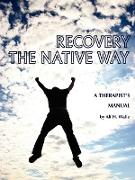Recovery the Native Way
BücherAngebote / Angebote:
In recent years, there has been a growing awareness that Native clients who suffer from substance
abuse often face challenges that are distinct from those experienced by the mainstream population.
For a number of years, I have been involved in research involving Native alcoholism and I have
recently published a book on the subject titled The Path of Handsome Lake: A Model of Recovery
for Native People. My book argues that many different Native cultures (in America and elsewhere)
face similar challenges and disruptions because their cultures are often under great stress and/or
because people are alienated from their heritage. The dyfunctional responses of many different
Native people are similar because they are subjected to similar pressures. In a nutshell, due to contact
with the outside world, Native cultures often experience disruptive transitions, and (in some
instances) entire cultures or ways of life may face extinction. Under such circumstances, the culture
loses the ability to support people and help them cope with the pressures of life. Cultural
decline itself often causes additional trauma. Combined, these pressures can trigger dysfunction
within the Native community. The obvious antidote for such maladies is to help Native substance abusers to reconnect with their heritage
in positive and constructive ways. My earlier book and this one are inspired by the life and work of nineteenth century Iroquois
leader Handsome Lake who developed a method to help Native people embrace their heritage as they recovered from substance abuse.
Because my earlier book was scholarly and not focused on practitioner issues, using it within a therapeutic context may be difficult.
Here, I adapt my ideas so they can be applied to therapy in a systematic and productive manner. The total program of therapy is presented
in three volumes. The first is a short overview of the program that has been written at about a 10th-grade reading level. My goal
is to provide a wide range of clients (as well as those who pursue self-help work) with an easily understood description of the program.
The second document is a consumable workbook designed to be used with the reader. The workbook can be used both within the context
of therapy and by those seeking strategies of self-help. The volume you are reading is a guide for therapists to consult when using
this method to help Native clients. It is hoped that all three of these texts will play a significant role in the therapy and recovery of
Native substance abusers.
Folgt in ca. 10 Arbeitstagen

